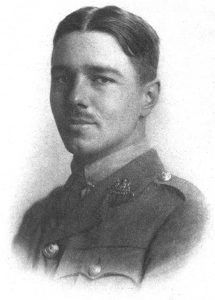Patrick’s army record contains dates of his service and his postings. The regimental war diaries provide some details of actions and places. For example, we know that, on 25th August 1914, the 2nd Battalion of the Manchester Regiment made a stand at Le Cateau. Here they lost 350 men, representing more than one third of their strength. They then retreated though Maretz, St. Quentin and Pointoise (28th August). They reached Carlepont on the 29th and Attichy on the 30th. This is the time when Patrick re-joined his Battalion, as a mobilised reservist. He would have found some very tired soldiers. They had already marched a long way. There would be more marching to come in the next month. They had taken a lot of casualties.
(Le Cateau (marked) is east of Caudry, on the junction of the D643 and D8 (which leads to St. Quentin). Carlepont is NW of Compiegne. Attichy is between Compiegne and Soissons, north of the River Aisne and the N31.) The distance from Le Cateau to Attichy is just over 60 miles (100 km). They covered this distance in five days in a fighting retreat. In other words, they were under fire at frequent intervals.
The records are factual, as they have to be. There is little sense of the experience of the individual soldier. Patrick died when I was a few days short of my 7th birthday. I was in no position to ask probing questions about life on the march, or in the trenches. My father said that he (Patrick) never talked about his experiences. From what I have discovered in my research, and more general reading, this was a common reaction. It is hardly surprising. Those of us who have enjoyed a safe, comfortable upbringing struggle to comprehend what life was like for a soldier in the Great War.
Terror, monotony, cold, wet, hunger, thirst, military discipline, the randomness of death, comradeship in extreme circumstances: what do I know of such things? Even if he had wanted to speak, I doubt if a poorly educated Irishman from Roscommon would have found the words to communicate adequately and effectively.
I have been able to gain some insight through the writings of one of his officers. This man is now seen as one of the towering figures in his field. At the time he was simply known as Second Lieutenant Wilfred Owen.
 Source: https://en.wikipedia.org/wiki/Wilfred_Owen#/media/File:Wilfred_Owen_plate_from_Poems_(1920).jpg
Source: https://en.wikipedia.org/wiki/Wilfred_Owen#/media/File:Wilfred_Owen_plate_from_Poems_(1920).jpg
His first period of service at the front (in early 1917) coincided with Patrick’s second period. The poems for which he became famous were based on his experiences of this time. And these experiences were shared by Private Patrick Stanley.
See also:
https://www.roscommonstanley.me.uk/military/poetry-please-part-2/
https://www.roscommonstanley.me.uk/military/poetry-please-part-1/
